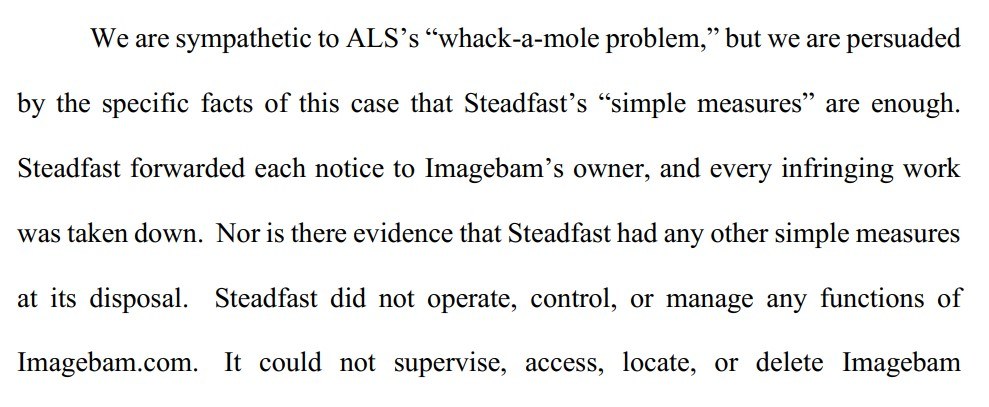In 2016, adult entertainment publisher ALS Scan dragged several third-party Internet services to court.
The company targeted companies including CDN provider CloudFlare and the Chicago-based hosting company Steadfast, accusing them of copyright infringement because they offered services to pirate sites.
ALS argued that Steadfast refused to shut down the servers of the image-sharing platform Imagebam.com, which was operated by its client Flixya. The hosting provider had been targeted with hundreds of DMCA notices, and ALS accused Steadfast of turning a blind eye to the situation.
In 2018, the hosting provider booked a significant victory. California District Court Judge George Wu dismissed all claims against Steadfast, including contributory copyright infringement and vicarious copyright infringement.
Steadfast wasn’t completely satisfied, however, as their request for attorneys’ fees was denied. The company filed an appeal on this ground. ALS, for its part, wanted Steadfast to be held liable for the infringements of its customer.
Steadfast Wins Appeal
Last Friday, the Ninth Circuit Court of Appeals decided on the matter. In a 2-to-1 majority ruling, it awarded a clear win to the hosting company.
According to the appeals court, it is clear that Steadfast took the required “simple measures” by forwarding DMCA notices to Imagebam, who then removed the infringing content.
ALS had argued that simply forwarding the notices is not enough. According to the rightsholder, the hosting company should have done more as it was clearly aware of the numerous infringements. The Court disagrees.
“ALS complains that it is not enough to forward the infringement notices to Imagebam’s owner in light of the number of infringement notices that Steadfast has received. But the number of notices is legally irrelevant,” the decision reads.
The situation may be different if a hosting provider is aware of ‘specific’ infringements and doesn’t take action. However, that is not the case here. The fact that pirated content continued to be uploaded doesn’t change that.
Simple Measures Are Enough
“We are sympathetic to ALS’s ‘whack-a-mole problem,’ but we are persuaded by the specific facts of this case that Steadfast’s ‘simple measures’ are enough,” the Court clarifies.

These “simple measures” are as far as Steadfast could go, according to the Court. There were no other ‘simple’ options available
“What measures were available to prevent further damage to ALS’s copyrighted images, Steadfast took,” the Court writes, noting that Steadfast didn’t operate, control, or manage any functions of Imagebam.com.
On top of that, the Court mentions that ALS itself hasn’t taken any other measures either. For example, the company didn’t take legal action against Imagebam directly.
Based on these and other arguments the district court ruling is upheld. In addition, the appeals court believes that attorney’s fees may be an option as well, and it sends that issue back to the district court for a do-over.
Circuit Court Judge Clifton Dissents
While the opinion is convincing, it’s not undisputed, as AVN also highlights. Circuit Court Judge Richard Clifton disagreed with the majority and dissented.
According to Judge Clifton, the majority correctly notes that Steadfast has to take adequate “simple measures” to avoid being held liable, but he disagrees that the measures are adequate when infringements continue.
“The majority expresses sympathy for the ‘whack-a-mole’ problem faced by ALS Scan, Inc., but that sympathy does not solve the problem,” Judge Clifton notes.
“Where, as here, there are allegations that the volume and magnitude of previous infringements caused a defendant to know that such infringements would continue tomorrow, and the next day, and the day after that, I would send this claim to the jury.”
—
A copy of the Ninth Circuit Court of Appeals memorandum is available here (pdf)
From: TF, for the latest news on copyright battles, piracy and more.
Source : Hosting Provider is Not Liable for ‘Pirate’ Site, US Appeals Court Rules













